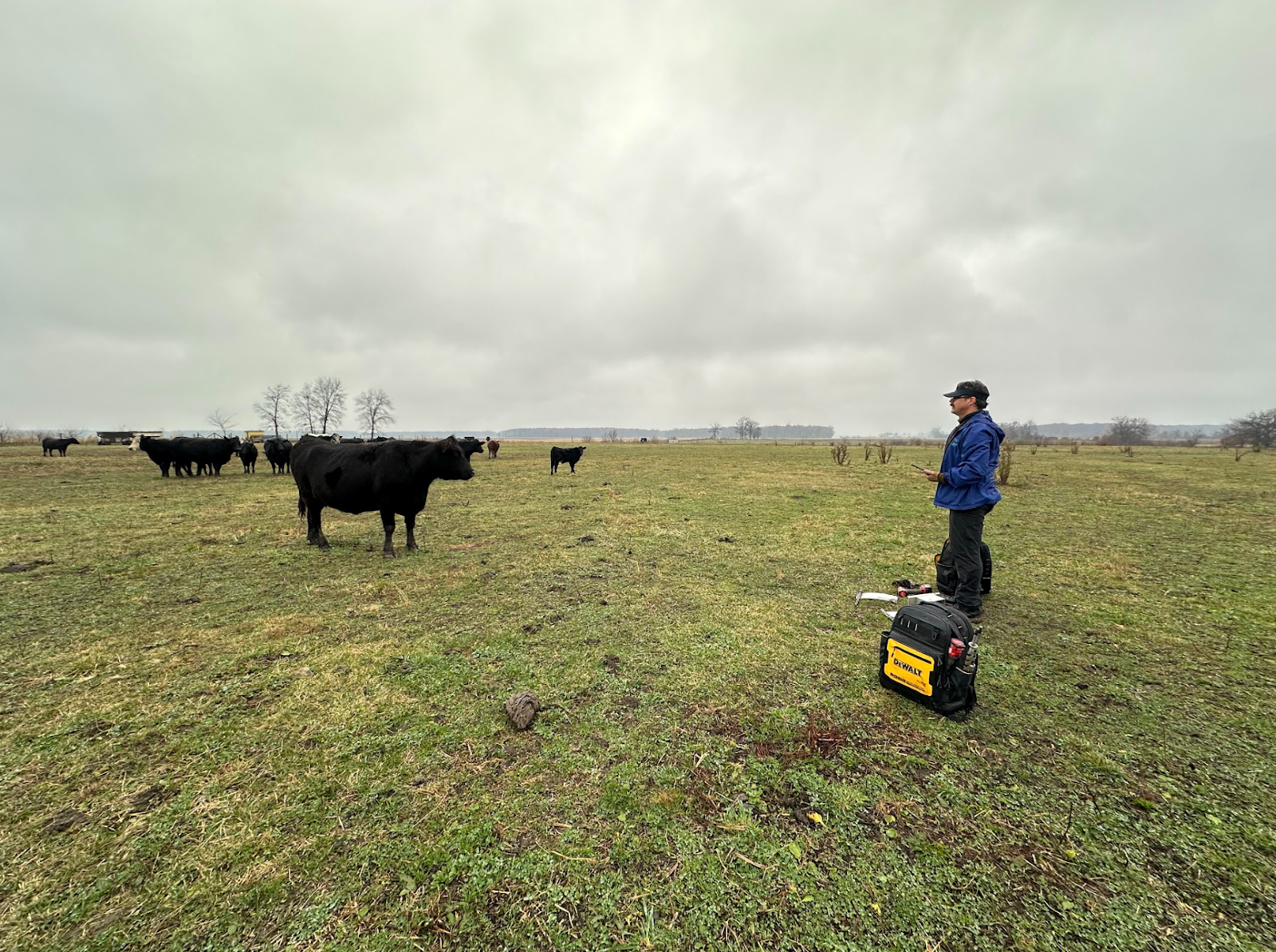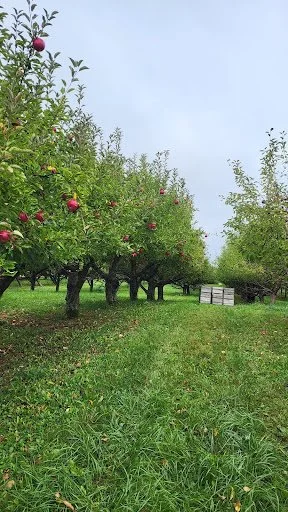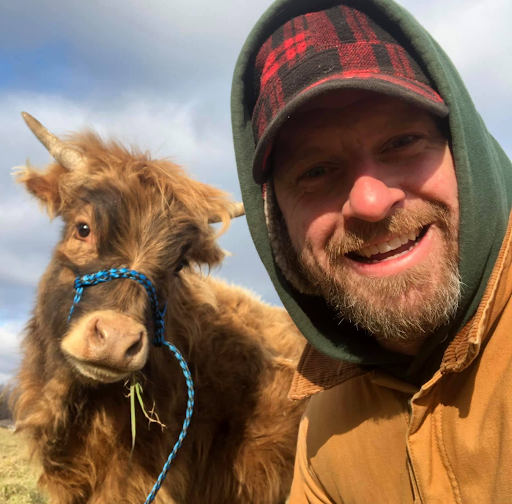Participating Farms
-

Brost Farms
Monroe
Brost Farms is a 6th-generation grassfed Angus cattle farm with 105 acres. In 2019, Kevin and Kaitlyn Minney began raising cattle and selling locally sourced meat products. They prioritize natural farming practices, avoiding hormones, daily biotics, and steroids. At their farmstand, you can purchase grassfed angus beef, berkshire pork, lamb, and pastured chicken. The Michigan Climate Smart Farms practices they are interested in: installing a winter water well for year-round cattle grazing, rehabilitating pastures from conventional row crops to rotational grazing, creating windbreak/shelterbelts to provide winter protection, and enhancing pasture-raised beef with native plantings and forage.
-

Baseline Farm
Dexter
Baseline Farm is a grassfed beef farm ecologically managed by John Cox. Established in 2016, the farm spans 260 acres, including 190 acres of pastures, and began with only 30 cattle. Today, he has 170 cows, steers, and bulls. You can buy his beef products at the two Argus Farm Stop locations, People’s Food Co-op, and farmers markets in Ann Arbor, Michigan. The Michigan Climate Smart Farms practices Baseline Farm is interested in: pursuing carbon amendments and pasture management through CSF practices, farm infrastructure, planting for soil health, and implementing a new water facility.
-

Fisheye Farms
Detroit
Fisheye Farms is an all natural and sustainable farm run by Andy Chae, Amy Eckert, and Susan Chae. The farm opened in 2015 after they purchased nine vacant lots, and the main farming site is now a .89 acre lot of farming land. Fisheye Farms grows fresh produce including various vegetables and fruits, you can purchase their crops at the Detroit Product Club CSA, local restaurants, and at their farm stand in Detroit, Michigan. The Michigan Climate Smart Farms practices Fisheye Farms is interested in: a soil steamer for beating back soil pathogens (the goal is to steam to 180 degrees for half an hour, hot compost pile temperature), implementing solar powered hoop houses, and digging a pond to drain water.
-

Frosty Apple Orchard
Dexter
Frosty Apple Orchard is a family owned and operated orchard that began in 1980. The property consists of 1600 trees and over 20 different kinds for sale. Julie Frost and her family, who own the farm, also offer winter holiday pies (Crumb Top Apple Pies) during the winter seasons on their website. The Frost Apple Orchard is open 10 weeks in the fall, just after Labor Day. The Michigan Climate Smart Farms practices Frost Apple Orchard is interested in: sustainable ground cover that will improve soil health, enhance nutrient cycling, suppress weeds, and reduce soil erosion; Using comfrey as a living mulch, and possibly implementing rotational crop rows.
-

Gateway Farm
Plymouth
Gateway Farm is a family owned farm committed to sustainable and regenerative agriculture. Bridget O’Brien and Charlie Brennan are the directors of Gateway Farm and also own the Garden Juju Collective. Their practices are inspired by permaculture design and include USDA-certified organic market gardening, food forests, land regeneration and re-wilding. Gateway Farms also host on-farm events, including educational workshops, sanctuary spaces, and markets. Their farm grows organic fruits, vegetables, and herbs. The Michigan Climate Smart Farms practices Gateway Farm is interested in: introducing composting, soil health and conservation practices, farm infrastructure, tree/shrub management, and water management. -

Mastodon Farm
Clayton
Mastodon Farm is run by Patrick Madden, who took over the 60-acre property from his grandfather in 2018. The farm focuses on regenerative agriculture, producing organic and holistically managed ground beef, pork, chicken, and eggs. Madden also grows chemical-free produce, including potatoes, butternut squash, turnips, radish, and greens. You can find his local honey, milk, broth, maple syrup and more on his website listed below. The Michigan Climate Smart Farm practices Mastodon Farm is interested in: pasture management and rehabilitation, soil carbon amendments, soil health and conservation, and water management.
-

Old City Acres
Ypsilanti
Old City Acres has been serving families locally since 2013 using ecological farming methods. For over a decade, the farm has worked to increase access to fresh, locally grown food and produce throughout Southeast Michigan. Owned and managed by Alexander Ball, this year-round, multi-farm operation offers free produce pickup locations and a $5 home delivery service for Michigan fruits, vegetables, and eggs to neighboring towns. The Michigan Climate Smart Farm practices Old City Acres is interested in: invasive species removal, cover cropping, soil health and conservation, and farm infrastructure.
-

Sanctuary Farms
Detroit
Sanctuary Farms was founded in 2021 by co-founders jøn kent and Parker Jean. They focus on transforming thousands of pounds of food waste into nutrient-rich compost for Detroit’s soil, offering both compost delivery and pickup services. Using permaculture and no-till practices, the team aims to create natural habitats while growing a diverse range of greens, root vegetables, corn, and squash, which they distribute to farmers’ markets across Metro Detroit. Browse their fresh produce inventory online here. The Michigan Climate Smart Farm practices Sanctuary Farms is interested in: solar powered system(s), compost facility, farm infrastructure, tree/shrub management, and water management.
-

Slow Farm
Ann Arbor
Slow Farm is a woman-owned, USDA-certified organic farm with an onsite farmstand spanning 187 acres. Founded in 2017 by Kim Bayer, Slow Farm offers heirloom produce, flowers, homemade kimchi, and fresh vegetables through their online shop. They also host ‘Learn How to Harvest’ workshops, providing communities with hands-on experiences of social and ecological farming methods. Their practices focus on no-till farming and avoiding the use of harmful pesticides, herbicides, and fertilizers. The Michigan Climate Smart Farm practices Slow Farm is interested in: planting cover crops on fields to reduce erosion, increase soil heath, and suppress excessive weeds.
-

Tuckers Farm
Temperance
Tuckers Farm is a vegetable farm owned by Bob and Sandy Potter. They took over the property from Sandy’s grandparents who founded it in 1919. The farm has been certified by the Michigan Agriculture Environmental Assurance Program (MAEAP) since 2011. Expanding across 10 acres, the Potters grow a diverse variety of produce, including tomatoes, peppers, eggplant, asparagus, and other fruits and vegetables, all cultivated using sustainable farming techniques. They use various soil and water conservation practices, such as crop rotation, pest management, wildlife habitat management, and composting. The Michigan Climate Smart Farm practices Tuckers Farm is interested in: irrigation systems, drainage control structure when storing or removing water, solar heating in hoop houses, soil carbon amendments, well and microirrigation, and planting cover crops in fields.
-

Whitney Farmstead
Ann Arbor
Whitney Farmstead is a farm that raises 100% grassfed beef and lamb, as well as pasture-raised pork and chicken. Owned by fifth-generation farmers Maliaka Whitney and Matthew Haarklou, the farm has been in operation since 1900. They practice regenerative ranching, diversified and restorative agriculture, rotational grazing, and organic methods, while also producing maple syrup products for their local community. The Michigan Climate Smart Farm practices Whitney Farmstead is interested in: implementing a winter water well facility, creating a shelterbelt to keep cattle pasturing year-round, agroforestry designing, rehabilitating pastures from conventional row crops to rotational grazing, and building windbreaks for winter protection.
